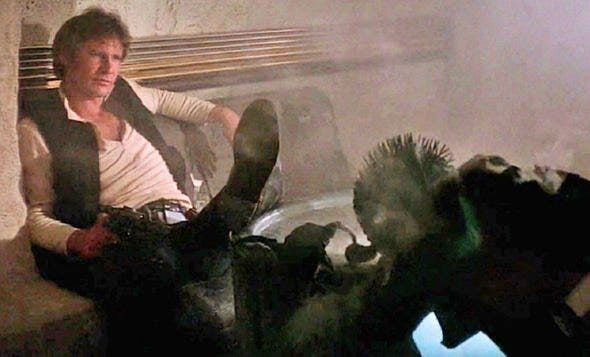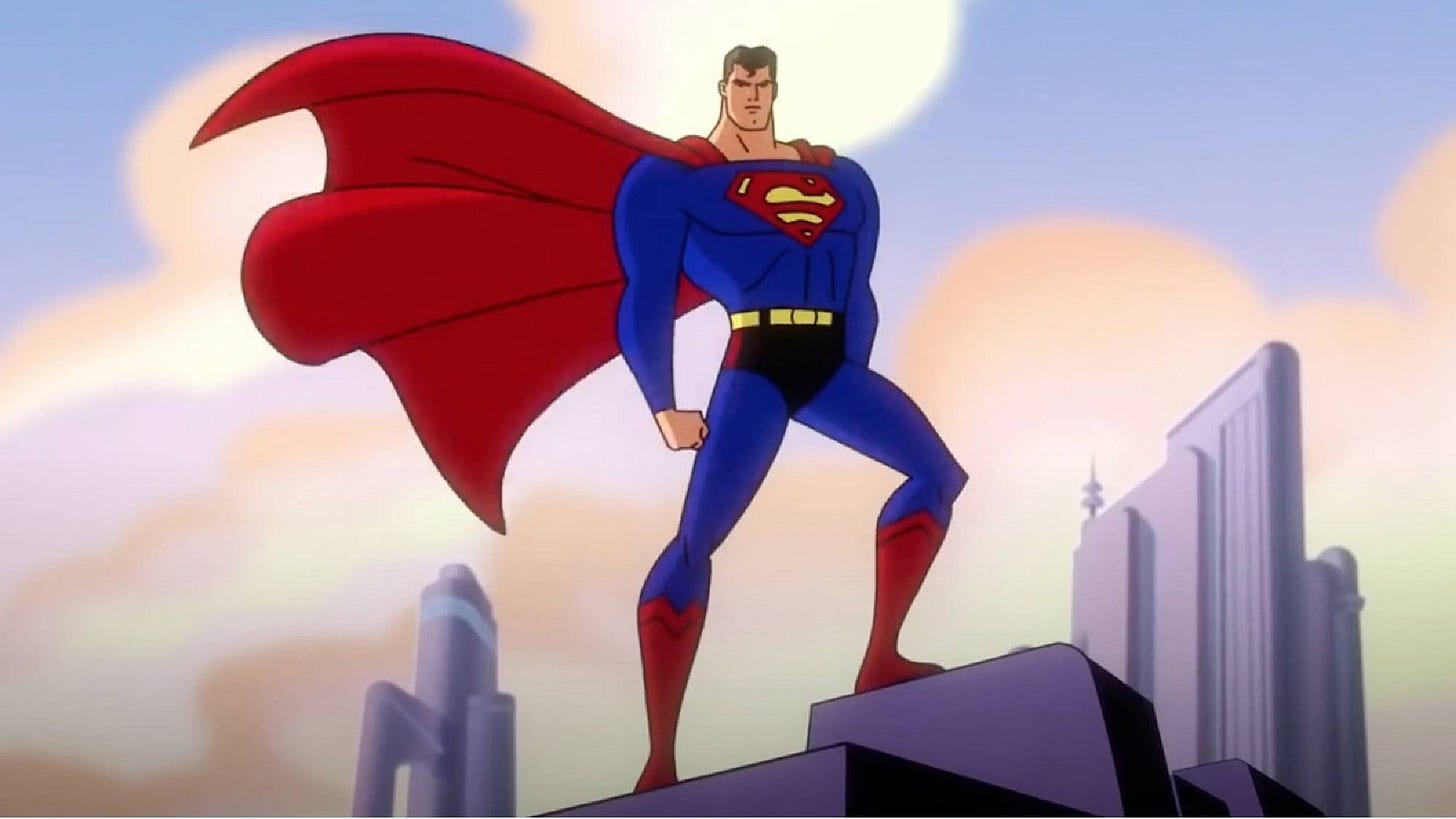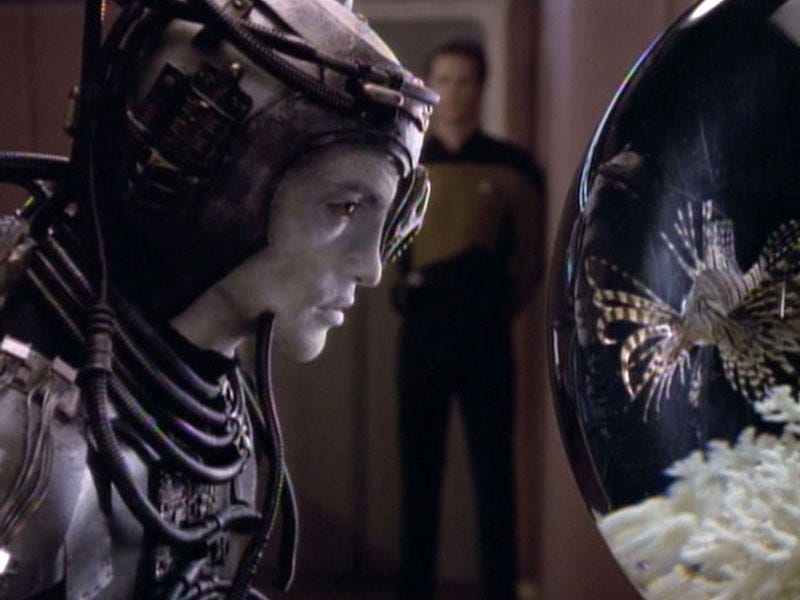Hollywood is good at producing entertainment, especially the kind that involves sex, car chases, and explosions. But they are not very good at moral philosophy. There is widespread agreement among American TV and movie writers on a certain moral perspective that would strike many as stupid. I suspect that most 5-year-old children can see the problems with Hollywood Morality that are missed by Hollywood writers.
Self-Defense
Let’s start with the case of Han Solo. Every Star Wars fan knows the scene:
Han is a smuggler who (allegedly) owes money to organized crime boss Jabba the Hutt (for dumping some illegal cargo when he was about to be boarded by an Imperial patrol). Jabba has put out a large bounty on Han’s head. In a bar, Han is held at gunpoint by Greedo, a bounty hunter working for Jabba. Han sits down at a table, with Greedo sitting across from him, still holding the gun. Han superficially tries to talk his way out of the situation, while at the same time surreptitiously unholstering his own gun underneath the table. A bit of the dialogue:
Greedo: You can tell that to Jabba. He may only take your ship.
Han: Over my dead body.
Greedo: That’s the idea. I’ve been looking forward to this for a long time.
Han: Yes, I’ll bet you have.
At that moment, there’s a small explosion, and Greedo falls over dead. Han shot him under the table.
That is the real (1977) version of the scene.
I gave you all that detail to make clear how absolutely justified this shooting is, as written. First, it’s not even clear that Han really owes Jabba the money. Second, be that as it may, it’s clear that Jabba has in mind something very unpleasant for Han, if Han lets himself be taken in. Third, Greedo’s response to the “over my dead body” comment is a 99% clear indication that Greedo intends to kill Han, probably in the next couple of seconds. Greedo is pointing a gun at Han at that moment, meaning that he can immediately kill Han with no further warning. The two are just a few feet apart, so if Greedo just squeezes his trigger, Han will be dead. Han cannot expect to get any further warning. He has no choice but to shoot Greedo, immediately. This really isn’t showing how hard-edged Han Solo is (which would be fine, since he is, after all, a smuggler who works for a crime boss and hangs out in a disreputable bar); it’s just showing that he has at least a minimal sense of self-preservation.
But that offended Hollywood Morality. The scene was subsequently altered at least four times. First, they edited the film to make a laser bolt come from Greedo’s gun first, magically missing Han’s head by a few inches, and then Han shoots Greedo. After a couple of trivial edits, there’s a final (2019) version in which, just before shooting, Greedo announces, “Maclunkey”, and then both shoot at the same time. Again, Greedo somehow misses the easiest shot in the world, but Han hits.
Why the changes? Han Solo is a “good guy”; therefore, he can’t do anything “bad”. If Han shot first, that would be Bad according to Hollywood Morality, so they changed it. Many fans were angered and/or contemptuous at the change, so later, Lucas edited it to make the two shoot at the same time (I guess thinking this would make the fans happy?). But to keep Han from having been bad, they have Greedo announce his intentions more explicitly. According to fans, “ma klounkee” is a Huttese phrase meaning “this is the end of you.”
Let’s leave aside the obvious aesthetic flaws here. Just suppose you want Han to not do anything bad. The fact that the writers thought the above changes were needed suggests that they thought Han was not justified in shooting in the original scene.
So we arrive at the first element of Hollywood Morality: pre-emptive strikes are always wrong, if there is even the slightest ambiguity. In slogan form: Good guys don’t shoot first. Self-defense requires (i) certainty of a (ii) imminent threat. If you’re pretty sure that someone is going to kill you, or you know that they plan to kill you later, that’s not good enough. You have to wait until they actually shoot, or they announce that they’re about to do it right then; only then can you use defensive force. (George Lucas more or less made this explicit.)
Retaliation
Similarly, if someone commits a heinous act of evil, it is wrong to retaliate against them; this makes you “no better than them.” You can only use force against them if they are using force right now. After their action is over, you cannot punish them. This remains true even if the person has committed multiple acts of evil in the past and will obviously commit many more in the future.
Exception: the government is allowed to punish people by putting them in jail. But if you’re not the government, you can’t do it. If you’re in some scenario where there is no government, then you have to let the criminals go. Sometimes, you can do stuff like exiling them, but you definitely can’t execute them.
For example, in the Netflix TV series The 100, John Murphy murders two other characters in cold blood, before attempting unsuccessfully to murder a third (who happens to be his own group’s leader). As “punishment”, the group exiles him from their camp, thus giving him another chance to potentially murder other people later. In later seasons, in Hollywood fashion, he turns into a good guy and everyone just forgets that he was a psychopathic killer.
In superhero stories, the heroes often manage to just barely prevail after a dangerous, life-and-death struggle against supervillains. The supervillains will be unbelievably dangerous people with devastating powers who are very likely to escape from custody and may even have done so multiple times in the past. It may be completely clear that the second they get the chance, they will mass murder more innocent people. In these circumstances, a “good” guy never considers ending the danger by killing the supervillain while they have the chance. Because that would be wrong.
Absolute Deontology
Hollywood morality also proposes absolute side constraints against treating (relatively) innocent people as means.
In one Star Trek episode (TNG:S5E23), the crew of the Enterprise captures a single Borg man. The Borg are an incredibly powerful and malevolent alien civilization. Humanity barely survived its last encounter with them, and the only reason the Borg aren’t immediately destroying the Federation at the moment is that they are busy conquering another part of the galaxy. It’s completely clear that the Borg will mercilessly destroy the Federation as soon as they get the chance.
The Enterprise crew devise a way to use their captive against the Borg. They can insert a kind of virus, like a computer virus, into his mind, and then send him back to the Borg Collective. When he rejoins them, his mind will be re-connected with all the other Borg. The virus will then spread throughout the Collective and finally disable the Borg. Everyone seems to agree that this will in fact work. It’s also pretty clear that this will probably be humanity’s only chance to defeat the Borg.
However, the single captured Borg, once separated from the Borg Collective, turns out to be a nice guy. They name him “Hugh” and some of the crew befriend him. Therefore, Picard decides that it would be Wrong to use him to destroy his people. So they abandon the virus plan, and they send him back to the Collective unmodified.
The lesson: Moral constraints against using people are absolute. You cannot treat a single person badly, even to save the entire human race, or even multiple species (since the Borg in fact threaten the entire galaxy).
The Problem with Hollywood Morality
You may have noticed one problem with Hollywood Morality: It is suicidal.
Regarding self-defense: If you know that someone is going to try to kill you, and you decide to wait for them to shoot first, you should expect your first notice of their attack to be when you feel the bullets entering your body. You should not expect them to announce when they’re just about to shoot, nor should you expect their first shot to miss. You should expect them to shoot you in the back, or while you’re sleeping, etc.
Regarding retaliation: If you give unlimited second chances to psychopath-like murderers, you should expect them to murder many more people. You should not expect them to turn into good guys. And pace Hollywood, using retaliatory force does not make you “just like” the aggressors. No, retaliating for obviously evil deeds is not morally just like attacking people out of sheer malice.
Regarding absolutism: If you decide to give up a chance to save the entire galaxy because you don’t want to harm one nice person, what you should expect to happen is that the entire galaxy is destroyed.
Maybe all these results strike you as acceptable: perhaps it really is better to sacrifice your life, or the lives of multiple innocent people, or even the entire species, to avoid being mean to your enemies? But I’ve never heard a reason why that is supposed to be true. TV characters normally just assert things like this with an air of self-righteousness.
The Hollywood Defense
Hollywood has a response. It is a response that can be given if and only if you control reality. The response is to just write the story so that even though the hero makes the suicidal decision, everything works out for them anyway. The opponent’s shot just somehow goes off to the side, leaving our hero unscathed. The psychopath-like murderer converts into a nice guy. Humanity miraculously discovers some other way to defeat a vastly larger, more advanced enemy.
The aesthetic flaw in stories like this is obvious. The ethical problem is that reality doesn’t actually work that way. Reality does not put a magical protection field around you for adhering to Hollywood morality. In reality, people who make suicidal decisions end up dead.
George Lucas thought that his fans were upset because they wanted Han Solo to be “a cold-blooded killer.” Apparently, Lucas really was that clueless. No, George, they didn’t want Han to be a cold-blooded killer. The fans just didn’t agree with your conception of a hero as a fool who gives every advantage to evil people yet somehow always winds up on top through sheer dumb luck.
Contrary Examples
There are some modern writers who are more mature than the traditional Hollywood writer. Consider George R.R. Martin (of Game of Thrones) or Cixin Liu (of The Three Body Problem). In their stories, people often suffer the expectable consequences of their decisions. In Martin’s or Liu’s worlds, if you give an enemy a chance to kill you, you just might be killed; being a good guy won’t protect you.
For a non-fool hero, see the TV series Justified.
Hollywood Politics
All this explains one reason why we should not take political advice from Hollywood. Their moral system, and therefore their political beliefs, are suited for fictional worlds that are designed to make us feel good; they are not suited for the actual world.
Consider Hollywood’s reaction to the Israel-Hamas conflict. Right after the war started, celebrities immediately called for a ceasefire. This fits with Hollywood morality. The October 7 attack was then in the past. While it was actually going on, sure, you could shoot back. But after the attack is over, a “good guy” would make peace at the first opportunity and trust the enemy to respect the ceasefire. No matter how many times they have attacked in the past, we can’t assume that they’re going to attack again. Maybe they will convert to being good guys. Maybe they will turn out to be decent people who are just misunderstood. That’s how things work in movies and TV shows, after all.
I wonder to what extent the American left has exported lessons from TV and movies to the real world, and to what extent people were already going to think like this and Hollywood merely applied common delusions about the real world to fictional worlds.
In any case, I think a good sign that your moral perspective is deeply misguided is that you can’t compellingly portray your values in a story without writing in miraculous strokes of good luck for your protagonists.







Great post.
I don't think these moral claims originated in Hollywood. I think they're pretty typical of people in the American Northeast; people who have a lot of ancestry from the Quaker settlers.
Interesting! Didn't realize they were editing old scenes like that.